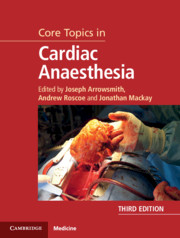Book contents
- Core Topics in Cardiac Anaesthesia
- Core Topics in Cardiac Anaesthesia
- Copyright page
- Dedication
- Contents
- Contributors
- Reviews of the First Edition
- Preface to the Third Edition
- Preface to the First Edition
- Foreword to the First Edition
- Abbreviations
- Section 1 Routine Cardiac Surgery
- Section 2 Anaesthesia for Specific Procedures
- Section 3 Cardiac Catheter Laboratory Procedures
- Section 4 Paediatric Cardiac Surgery
- Section 5 Cardiopulmonary Bypass
- Chapter 24 Temperature Management and Deep Hypothermic Arrest
- Chapter 25 The Effects of Cardiopulmonary Bypass on Drug Pharmacology
- Chapter 26 Controversies in Cardiopulmonary Bypass
- Chapter 27 Cardiopulmonary Bypass Emergencies
- Chapter 28 Non-Cardiac Applications of Cardiopulmonary Bypass
- Chapter 29 Extracorporeal Membrane Oxygenation
- Section 6 Advanced Monitoring
- Section 7 Transoesophageal Echocardiography
- Section 8 Miscellaneous Topics
- Index
- References
Chapter 26 - Controversies in Cardiopulmonary Bypass
from Section 5 - Cardiopulmonary Bypass
Published online by Cambridge University Press: 12 May 2020
- Core Topics in Cardiac Anaesthesia
- Core Topics in Cardiac Anaesthesia
- Copyright page
- Dedication
- Contents
- Contributors
- Reviews of the First Edition
- Preface to the Third Edition
- Preface to the First Edition
- Foreword to the First Edition
- Abbreviations
- Section 1 Routine Cardiac Surgery
- Section 2 Anaesthesia for Specific Procedures
- Section 3 Cardiac Catheter Laboratory Procedures
- Section 4 Paediatric Cardiac Surgery
- Section 5 Cardiopulmonary Bypass
- Chapter 24 Temperature Management and Deep Hypothermic Arrest
- Chapter 25 The Effects of Cardiopulmonary Bypass on Drug Pharmacology
- Chapter 26 Controversies in Cardiopulmonary Bypass
- Chapter 27 Cardiopulmonary Bypass Emergencies
- Chapter 28 Non-Cardiac Applications of Cardiopulmonary Bypass
- Chapter 29 Extracorporeal Membrane Oxygenation
- Section 6 Advanced Monitoring
- Section 7 Transoesophageal Echocardiography
- Section 8 Miscellaneous Topics
- Index
- References
Summary
Despite more than six decades of clinical experience and considerable research, the characteristics of ‘optimal’ CPB remain imprecisely defined. This chapter discusses the main areas of controversy (Box 26.1).
- Type
- Chapter
- Information
- Core Topics in Cardiac Anaesthesia , pp. 203 - 209Publisher: Cambridge University PressPrint publication year: 2020



